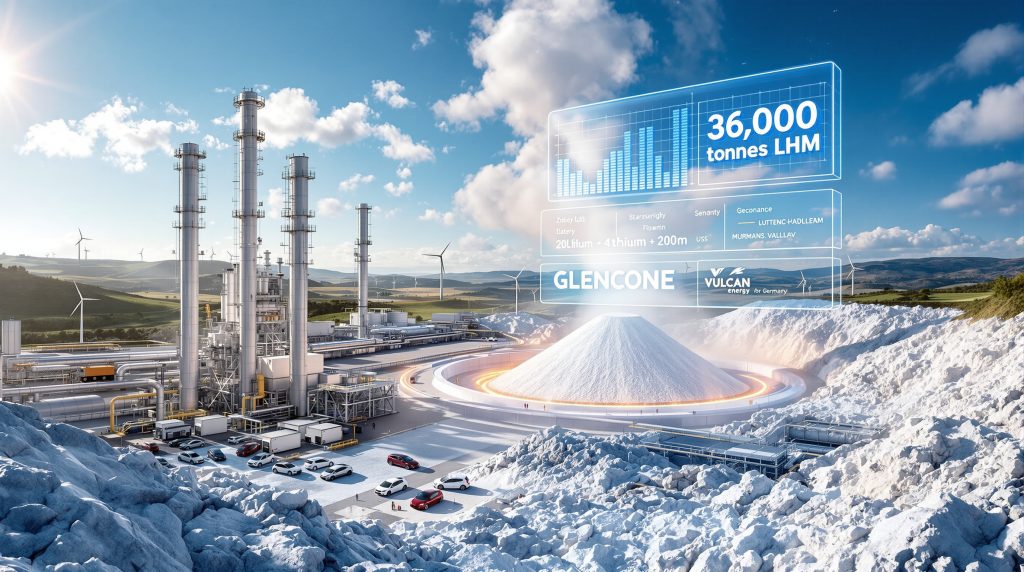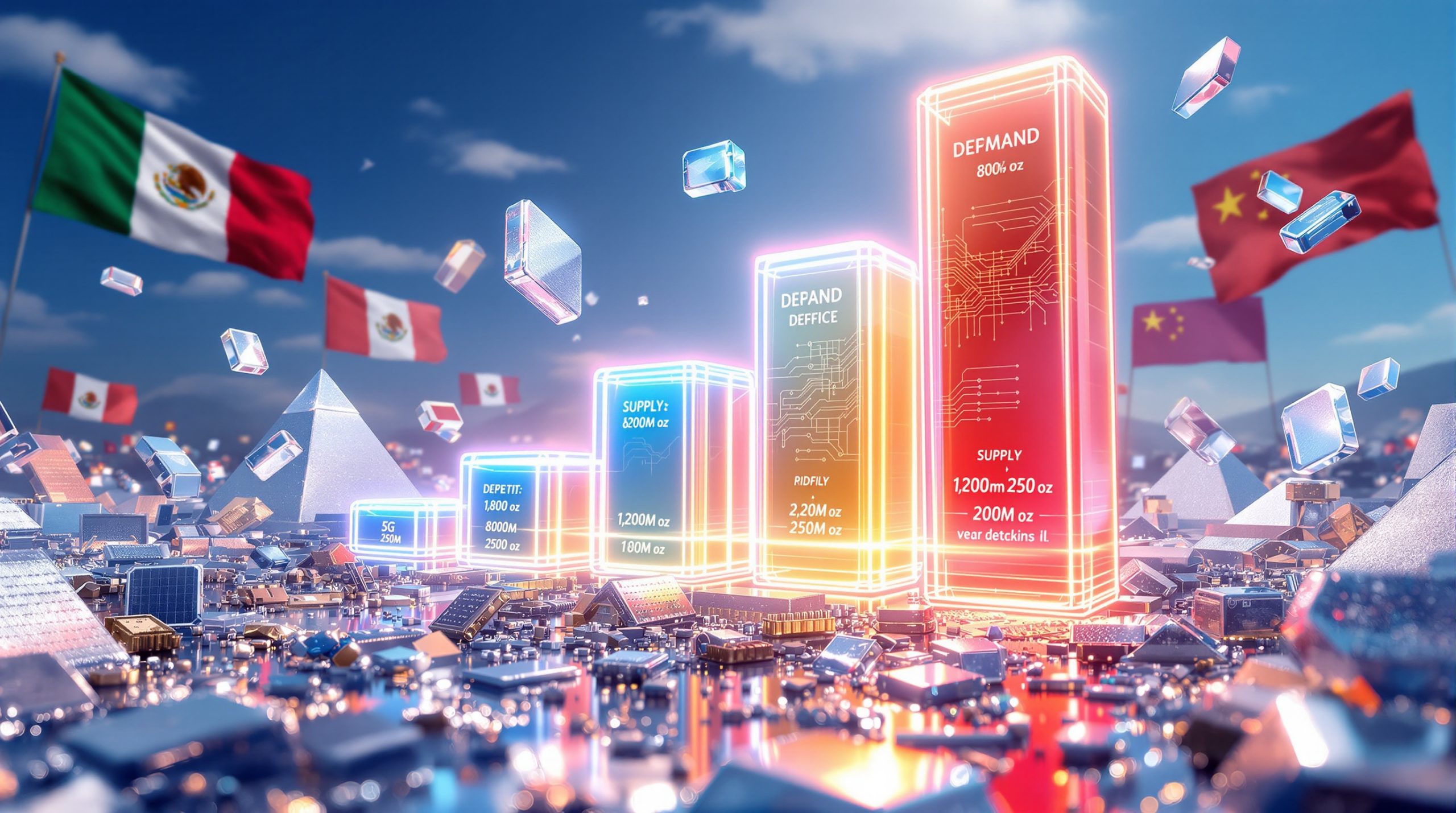The Strategic Significance of Europe's First Domestic Lithium Supply Chain
Vulcan supplies lithium to Glencore through a pivotal eight-year binding agreement to supply lithium hydroxide monohydrate to a wholly-owned subsidiary of commodities giant Glencore, marking a transformative moment for European battery supply chain independence. This partnership represents far more than a commercial transaction; it establishes the continent's first fully integrated domestic lithium production pathway from extraction through processing.
The agreement encompasses delivery of 36,000 to 44,000 tonnes of battery-grade lithium hydroxide monohydrate over eight years, positioning Glencore as Vulcan's fourth major offtake partner alongside automotive manufacturer Stellantis, battery producer LG Energy Solution, and cathode materials specialist Umicore. This diversified customer portfolio demonstrates the strategic value of European lithium production across multiple industry segments.
Europe's dependency on imported lithium has created significant supply chain vulnerabilities, with the continent currently importing approximately 97-99% of its lithium requirements according to the European Commission's Critical Raw Materials Act. The geopolitical implications of this dependency have become increasingly apparent, particularly following supply chain disruptions experienced during 2020-2022, highlighting the importance of energy transition security.
Key Financial and Production Metrics
The commercial parameters of Vulcan's comprehensive offtake portfolio illustrate the scale of European lithium demand and the company's strategic positioning within this market transformation.
| Customer | Contract Volume (tonnes LHM) | Year Signed | Industry Sector |
|---|---|---|---|
| Stellantis | 81,000-99,000 | End of 2021 | Automotive OEM |
| LG Energy Solution | 41,000-50,000 | 2022 | Battery Manufacturing |
| Umicore | 28,000-42,000 | 2021 | Cathode Materials |
| Glencore | 36,000-44,000 | October 2025 | Commodities Trading |
The combined upper range of these contracts totals 235,000 tonnes of lithium hydroxide monohydrate, representing approximately ten years of production at Vulcan's Phase One target capacity of 24,000 tonnes annually. This production volume translates to sufficient lithium for roughly 500,000 electric vehicle batteries per year, highlighting the significant impact on European automotive electrification.
Vulcan's Phase One Lionheart project targets annual production of 24,000 tonnes, with the Glencore agreement serving as the final offtake requirement for project financing completion. The company expects to finalise its financing package in Q4 2025, enabling construction of commercial-scale facilities to commence.
How Does Vulcan's Geothermal Extraction Method Revolutionise Lithium Production?
Zero-Carbon Lithium Processing Technology
Vulcan Energy's revolutionary approach to lithium extraction fundamentally differs from traditional methods employed in South America's Atacama Desert or Australia's hard-rock mining operations. The company's direct lithium extraction technology utilises geothermal brines from the Upper Rhine Graben thermal waters, eliminating the environmental impacts associated with conventional production methods.
The technical process involves two primary facilities:
• LEOP (Lithium Extraction Optimisation Plant) in Landau filters high-purity lithium chloride concentrate from thermal water sources
• CLEOP (Central Lithium Electrolysis Optimisation Plant) in Frankfurt-Höchst converts the concentrate into battery-grade lithium hydroxide monohydrate
• Renewable energy integration powers the entire process using geothermal energy from the same thermal water source
• Closed-loop system rejects thermal water back into the aquifer, eliminating freshwater consumption
In January 2025, Vulcan achieved a historic milestone by producing the first battery-grade lithium hydroxide monohydrate manufactured entirely within Europe, from raw material extraction through final processing. This accomplishment demonstrates the viability of European lithium independence and establishes a template for sustainable critical mineral production, representing a significant step in sustainable mining transformation.
Production Facility Infrastructure
The scaling from pilot to commercial operations represents one of the most significant technical challenges facing Vulcan Energy. Current pilot facilities operate at a 1:50 ratio compared to planned commercial capacity, requiring substantial technological validation and process optimisation.
Current Infrastructure Status:
• Building permits secured for Frankfurt-Höchst commercial facility (September 2025)
• Pilot plant validation demonstrating technical feasibility at smaller scale
• Construction timeline targeting 2026-2027 for commercial facility completion
• Recovery rates expected to achieve 70-90% lithium extraction efficiency compared to 30-50% from traditional evaporation methods
The Upper Rhine Graben contains geothermal brines with lithium concentrations ranging from 150-200 mg/L, making it one of Europe's most significant lithium resources according to the Geological Survey of Germany. This geological advantage provides Vulcan with a sustainable, long-term resource base for commercial operations, similar to other lithium brine operations globally.
Why Did Glencore Choose Vulcan Over Traditional Lithium Suppliers?
Strategic Portfolio Diversification Benefits
Glencore's decision to partner with Vulcan Energy reflects broader strategic considerations beyond simple commodity procurement. As one of the world's largest commodity trading companies with revenues of $255.98 billion in 2023, Glencore possesses sophisticated understanding of global supply chain dynamics and risk mitigation strategies.
The partnership offers Glencore several competitive advantages:
• Geographic proximity to European battery manufacturers, reducing transportation costs and lead times
• Climate-neutral supply chain alignment with increasingly stringent ESG investment criteria
• Supply security through domestic European production, reducing geopolitical risks
• Market diversification away from South American lithium triangle dependency
Competitive Advantages Over South American Operations
Traditional lithium extraction from Chile, Argentina, and Bolivia faces mounting challenges that make Vulcan's German operations increasingly attractive. The so-called Lithium Triangle contains approximately 58% of global lithium reserves, creating dangerous geographic concentration risks for battery manufacturers.
Furthermore, Vulcan's binding lithium supply agreement with Glencore demonstrates the growing recognition of European production capabilities. European battery manufacturers importing from Chile face approximately 12,000+ kilometre shipping distances compared to under 500 kilometres for German-produced lithium, significantly reducing logistics costs and supply chain complexity.
Environmental and Operational Comparisons:
| Factor | Traditional Evaporation | Vulcan Geothermal DLE |
|---|---|---|
| Water Consumption | 500,000 gallons per tonne | Zero freshwater use |
| Processing Time | 12-24 months | Days to weeks |
| Land Requirements | 2,000+ hectares | <50 hectares |
| Recovery Rate | 30-50% | 70-90% |
| Carbon Intensity | 3-5 tonnes CO2-eq/tonne | <1 tonne CO2-eq/tonne |
The European Union's Critical Raw Materials Act mandates that at least 10% of annual strategic raw material consumption should be extracted domestically by 2030, with 40% processed within EU borders. Moreover, Glencore's lithium hydroxide deal directly supports these strategic autonomy objectives while providing Glencore with preferential access to policy-supported supply chains.
What Does This Mean for Vulcan's Customer Portfolio Balance?
Comprehensive Industry Coverage Strategy
Vulcan Energy's customer diversification strategy demonstrates sophisticated understanding of battery supply chain dynamics and risk management. The company has systematically targeted different segments of the lithium value chain, creating a balanced portfolio that reduces dependency on any single industry sector.
Portfolio Risk Distribution Analysis:
• Automotive OEMs (Stellantis): Represents direct end-user demand with long-term visibility but cyclical industry exposure
• Battery Manufacturers (LG Energy Solution): Provides access to multiple automotive brands while maintaining technology neutrality
• Cathode Materials (Umicore): Captures specialised processing segment with higher margins and technical barriers
• Commodities Trading (Glencore): Offers market flexibility and global distribution capabilities
This diversified approach contrasts sharply with lithium producers that concentrate sales within single customer segments, creating vulnerability to sector-specific downturns or technological disruptions. Each customer represents different contract structures, pricing mechanisms, and delivery requirements, optimising Vulcan's revenue stability across market cycles.
Risk Distribution and Market Flexibility
The timing of customer acquisitions also demonstrates Vulcan's strategic market development. Stellantis and Umicore agreements secured in 2021 established initial offtake credibility during early development phases. LG Energy Solution's 2022 contract validated battery manufacturer demand, while Glencore's 2025 agreement provides commodity market access and completes financing requirements.
Customer Integration Benefits:
• Stellantis European operations: Five battery gigafactories with combined capacity exceeding 140 GWh annually planned by 2030
• LG Energy Solution European capacity: Manufacturing facilities in Poland with additional European capacity totalling over 70 GWh by 2025
• Umicore European production: Cathode material production capacity targeted to reach 175,000 tonnes per year by 2025
• Glencore global distribution: Access to worldwide commodity trading expertise and market intelligence
How Does This Agreement Impact European Battery Supply Chain Independence?
Geopolitical Supply Security Implications
The Vulcan-Glencore partnership occurs within a broader context of European strategic autonomy initiatives and critical mineral security concerns. China currently controls approximately 60-70% of global lithium refining capacity, creating dependencies that European policymakers view as economically and politically problematic.
The EU Critical Raw Materials Act establishes specific targets for domestic production and processing capacity:
• 10% extraction target: Domestic EU extraction of annual strategic raw material consumption by 2030
• 40% processing target: EU-based processing of annual strategic raw material consumption by 2030
• 25% recycling target: Recycled content in annual strategic raw material consumption by 2030
European lithium demand projections indicate massive growth requirements, with consumption expected to increase from approximately 80,000 tonnes lithium carbonate equivalent (LCE) in 2025 to over 700,000 tonnes LCE by 2035 according to the European Commission Joint Research Centre, reflecting the broader mining industry evolution taking place across Europe.
Timeline for Commercial Production Scaling
Vulcan Energy's development timeline aligns with European industrial policy objectives and battery manufacturer expansion plans. The company's phased approach balances technical risk management with market opportunity capture.
Development Milestones:
• Q4 2025: Project financing completion following Glencore agreement finalisation
• 2026-2027: Commercial facility construction in Frankfurt-Höchst industrial park
• 2028: Target commencement of full-scale 24,000 tonnes annual production
• 2030+: Potential Phase Two expansion beyond Lionheart project scope
This timeline positions Vulcan to capture growing European demand while supporting continental supply chain independence objectives. European battery gigafactory capacity is expected to exceed 700 GWh by 2030, requiring approximately 150,000-200,000 tonnes of lithium hydroxide annually.
What Are the Financial Implications for Phase One Project Financing?
Offtake Security for Investment Confidence
The completion of Vulcan's offtake portfolio through the Glencore agreement eliminates a critical financing constraint for the Lionheart project. Large-scale lithium projects typically require 60-70% debt financing with 30-40% equity contributions, with offtake agreements serving as essential revenue certainty for lenders.
Project financing for battery materials facilities faces unique challenges compared to traditional mining operations. Lenders must evaluate technological risks, market volatility, and regulatory compliance alongside conventional project economics. Vulcan's diversified customer base mitigates counterparty concentration risk while demonstrating sustained market demand.
Financing Structure Benefits:
• Complete offtake coverage for Phase One production capacity reduces revenue risk
• Diversified counterparties across automotive, battery, materials, and trading sectors
• European focus aligns with ESG investment criteria and policy support
• Long-term contracts provide predictable cash flow projections for debt servicing
Revenue Projection Analysis
Lithium hydroxide pricing has experienced extreme volatility, fluctuating from approximately $13,000-$15,000 per tonne in Q3 2025 to peaks exceeding $80,000 per tonne during 2022 supply shortages. Long-term offtake contracts typically incorporate pricing formulas that balance producer revenue stability with customer cost predictability.
However, investment context reveals that battery-grade lithium hydroxide production facilities typically require capital expenditure of $20,000-$30,000 per tonne of annual capacity according to industry benchmarks, suggesting Vulcan's 24,000 tonne facility represents substantial infrastructure investment.
While specific contract pricing remains confidential, the scale of committed volumes provides revenue visibility that supports debt financing at competitive terms. Industry analysts estimate that sustained lithium prices above $15,000 per tonne support healthy project economics for European DLE operations.
How Does Vulcan's Technology Compare to Traditional Lithium Extraction Methods?
Environmental Impact Comparison
Vulcan Energy's geothermal Direct Lithium Extraction technology addresses fundamental environmental concerns associated with conventional lithium production methods. Traditional evaporation pond operations in South America require massive freshwater consumption and extensive land use, creating conflicts with local communities and ecosystems.
Quantitative Environmental Comparisons:
• Water consumption: Traditional evaporation requires 500,000 gallons per tonne versus zero freshwater use for geothermal extraction
• Processing timeline: Evaporation ponds require 12-24 months compared to weeks for DLE technology
• Land footprint: Traditional operations span 2,000+ hectares versus under 50 hectares for equivalent geothermal production
• Recovery efficiency: DLE achieves 70-90% lithium extraction versus 30-50% from evaporation methods
The carbon intensity differences are particularly significant for European battery manufacturers facing increasing pressure to demonstrate supply chain sustainability. Traditional hard-rock lithium mining produces 8-15 tonnes of CO2-equivalent per tonne of lithium carbonate equivalent, while brine evaporation generates 3-5 tonnes CO2-eq per tonne. Consequently, vulcan supplies lithium to Glencore through geothermal-powered processes that achieve substantially lower carbon intensity through renewable energy utilisation.
Production Cost Structure Advantages
Beyond environmental benefits, Vulcan's European operations offer structural cost advantages for battery manufacturers serving European markets. Transportation expenses for lithium imports from South America can exceed $1,000 per tonne, while domestic German production eliminates these logistics costs entirely.
Economic Efficiency Factors:
• Transportation cost elimination for European battery manufacturers
• Reduced processing complexity compared to spodumene ore conversion
• Renewable energy cost stability versus volatile fossil fuel inputs
• Supply chain reliability reducing inventory and hedging requirements
The technological advantages extend beyond cost considerations to operational flexibility. DLE systems can adjust production rates more rapidly than evaporation ponds, enabling better response to market demand fluctuations and customer delivery requirements.
What Challenges Could Impact Vulcan's Supply Commitments to Glencore?
Technical Scaling Risks
The transition from pilot-scale operations to commercial production represents Vulcan Energy's most significant near-term challenge. The company must achieve a 50x scaling factor from current LEOP and CLEOP facilities to meet contracted delivery obligations, requiring substantial process optimisation and equipment validation.
Potential Technical Hurdles:
• Geothermal resource consistency over extended production periods and seasonal variations
• Processing technology optimisation for consistent battery-grade specifications
• Equipment reliability at commercial scale versus pilot plant operations
• Quality control systems meeting automotive industry standards across all customer segments
The Upper Rhine Graben geothermal resource has operated for decades supporting renewable energy generation, providing some confidence regarding long-term availability. However, lithium extraction adds complexity to thermal water management and requires careful monitoring to prevent resource degradation.
Market Competition and Pricing Pressures
Vulcan Energy faces increasing competition from both traditional lithium producers expanding capacity and other European DLE projects entering development. Several companies have announced plans for geothermal lithium extraction across Germany and other European regions, potentially creating oversupply conditions.
Industry Dynamic Considerations:
• Global lithium capacity expansion from established South American and Australian producers
• Technology competition from alternative battery chemistries reducing lithium intensity
• Regulatory compliance costs across German environmental and industrial standards
• Customer bargaining power as European supply options increase
Lithium market volatility has historically challenged project economics across all production methods. While long-term contracts provide some price stability, material adverse changes in market conditions could affect customer willingness to accept contracted volumes or pricing adjustments.
What Does This Partnership Signal for Future European Lithium Development?
Industry Precedent and Replication Potential
The successful completion of Vulcan's offtake portfolio establishes important precedents for European critical mineral development initiatives. The validation of geothermal lithium extraction at commercial scale could catalyse similar projects throughout the Rhine Valley region and other European geothermal resources.
Neptune Energy recently confirmed significant lithium resources in German geothermal fields, while several other companies are advancing European DLE projects at various development stages. Vulcan's partnership with established industry players like Stellantis, LG Energy Solution, and Glencore demonstrates market confidence in European lithium production viability.
Broader Market Implications:
• Investment capital attraction for European critical mineral projects
• Technology validation supporting similar geothermal lithium initiatives
• Policy support enhancement through demonstrated domestic production capability
• Supply chain diversification reducing European dependency on imported materials
Long-term Strategic Positioning
Vulcan Energy's success could fundamentally reshape European battery supply chain architecture. The company's integrated approach from resource extraction through processing creates vertical integration opportunities that traditional import-dependent operations cannot replicate.
Future growth potential extends beyond Phase One production capacity. The Upper Rhine Graben contains sufficient geothermal resources to support multiple production facilities, while technological advances in DLE efficiency could enhance resource utilisation. In addition, vulcan supplies lithium to Glencore through operational experience that may also create licensing opportunities for geothermal lithium extraction in other global markets.
Strategic Development Opportunities:
• Phase Two expansion targeting additional 24,000+ tonnes annual capacity
• Technology licensing to other European geothermal regions
• Downstream integration into cathode materials or battery cell manufacturing
• Resource exploration across broader European geothermal basins
Transforming Europe's Critical Mineral Independence
Key Takeaways for Industry Stakeholders
Vulcan Energy's comprehensive offtake portfolio completion through the Glencore agreement represents a pivotal moment in European industrial policy execution. The partnership validates both the technical feasibility of large-scale geothermal lithium extraction and the commercial viability of European battery supply chain independence.
Strategic Significance Summary:
• First commercial European lithium supply chain from extraction through processing established
• Technology demonstration at industrial scale supporting broader European critical mineral initiatives
• Customer diversification across automotive, battery, materials, and trading sectors reducing market risk
• Policy alignment with EU Critical Raw Materials Act objectives and strategic autonomy goals
Investment and Market Implications:
The successful development of Vulcan's Lionheart project could catalyse significant investment in European critical mineral production across multiple commodities. Battery manufacturers gain supply security while supporting continental industrial policy objectives, creating alignment between commercial and political interests.
For Glencore specifically, the partnership provides access to climate-neutral lithium supplies supporting ESG commitments while diversifying geographic sourcing risk. The commodity trader's global expertise combined with Vulcan's innovative production technology creates mutual strategic value beyond simple supply agreements.
European automotive manufacturers benefit from reduced supply chain complexity and transportation costs, while supporting domestic industrial development. The timing aligns perfectly with accelerating European EV production and battery gigafactory construction, ensuring demand growth for domestically-produced lithium.
Future Market Development:
Industry observers should monitor Vulcan's commercial production ramp-up as a bellwether for European critical mineral independence initiatives. Success could trigger substantial investment in similar projects, while challenges might inform policy adjustments and technology development priorities.
The broader implications extend beyond lithium to encompass other critical materials including rare earth elements, cobalt, and nickel. European companies and policymakers are closely watching Vulcan's progress as a template for domestic supply chain development across multiple strategic commodities.
This analysis is based on publicly available information and industry research. Lithium market dynamics involve significant volatility and technological risks that could impact project outcomes. Investors should conduct independent due diligence before making investment decisions related to lithium producers or battery supply chain companies.
Looking to Capitalise on Europe's Critical Mineral Revolution?
Discovery Alert's proprietary Discovery IQ model delivers real-time notifications on significant ASX mineral discoveries, empowering investors to identify actionable opportunities in the rapidly evolving critical minerals sector. Explore historic examples of exceptional discovery returns and begin your 30-day free trial today to position yourself ahead of the market.




